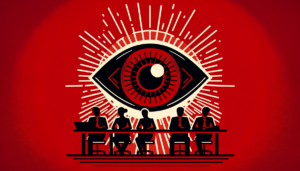Are we living through the democratisation of leadership?
- 5 Min Read
Is the traditional separation between manager and leader also shifting towards a more democratized view of what we would consider ‘leadership traits’?
- Author: Chiara Madrone
- Date published: Nov 22, 2022
- Categories

The systemic events we have been experiencing, such as the crisis of hyper-consumerism, the climate change crisis, the global financial crisis and the global pandemic, have profoundly influenced how organizations have re-configured themselves. Workplace trends already underway have taken a much faster pace enabling hybrid and virtual work as the norm but also fundamentally altering jobs and skills required.
Individuals have re-focussed their values towards human empowerment, becoming active participants of purpose-driven change to search for meaning and reappropriate quality of life.
Is the traditional separation between manager and leader also shifting towards a more democratized view of what we would consider ‘leadership traits’? But more importantly, in today’s context, is it still relevant to distinguish between managers and leaders?
In an article republished in 2004, Abraham Zaleznik describes the difference between the two very clearly. Managers embrace practical responsibilities. Managerial culture emphasizes rationality and control but cannot visualize purpose and generate value in work. On the other hand, leaders shape ideas instead of responding to them. They alter moods and emotions around them, transforming ideas into a collective imagination that drives action and determines fresh directions. Where managers are problem solvers, leaders open issues to new options.
The empowered employee
In a reversed way, Abraham Zaleznik’s idea of the leader as an active rather than reactive figure, shaping ideas instead of responding to them, aligns with much organizational rhetoric, albeit aimed more generically at employees.
The underlying message is often an invitation to entrepreneurship. Thanks to the design of many organizations today, it is frequently expected from diverse roles to project ideas to images that excite people to lead them towards a specific direction, sometimes ahead of giving those images substance. Organizations openly ask their employees to be explorers, open to new ideas, innovate and practice curiosity to learn continuously.
Shifts across multiple layers of the organizational context have altered the social contract to the point that talent within organizations is empowered to choose and shape their own paths making structure and hierarchy less and less relevant and losing their appeal to the new generation as a measure to success.
Katy George offers us a thought-provoking analysis of competition in the new talent market claiming that self-authorship has replaced traditional career paths. I would add that this is our cue to evolve the thinking on what is considered leadership within organizations and where it manifests.
According to a recent survey, almost a third of the employees leaving their jobs recently did so to start a business.
Is this an indication of the commoditization of leadership or the culmination of the empowered rhetoric leading to a rebellion against more traditional structures? Possibly both.
The silent coaching revolution
In a famous quote, Bill Gates said ‘Everyone needs a coach. We all need people who will give us feedback. That’s how we improve’.
In the past decade, management has been led to move from transactional conversations with their teams to transformational discussions to sustain and focus organizational performance.
In 2012, Harvard Business Review highlighted the significance of the organizational shift towards conversations based around greater intimacy, gaining trust, listening well, and creating genuine dialogue. Transformational conversations enable a broadening of perspectives in times of change and increasing uncertainty.
There has been a recognition of managers’ power in perpetuating the organizational culture and driving emotional commitment to the organization by inspiring their employees to do their best work, to add value to the communities in which organizations operate. Managers as coaches provide developmental feedback to their teams, establishing a level of trust, shaping value and directing employees’ positive contributions to the organization.
Management is no longer there to set goals within a given framework but needs to inspire and create advocacy through their behaviors at all levels within organizations. As coaches, managers motivate, inspire, and engage their teams while caring about each team member as an individual. These characteristics traditionally associated with leadership are now normalized in the very essence of management practices.
Learned leadership traits for all
In the new workplace, hybrid technologies bring together global capabilities. Through agile working patterns, organizations can create more flexible working formations as more and more employees can pick who they want to work and connect with. McKinsey claims that its ‘up or out’ policy has morphed into a post-pandemic ‘grow skills or go’ in which people are expected to continuously develop themselves and acquire new skills to increase their impact.
To continue being competitive, organizations need to cultivate leadership transversally and find ways to provide more development and personal opportunities than ever before. Allowing employees to practice empowerment and test their boundaries alongside creating an environment to receive and share developmental feedback as a catalyst to personal growth can prove a winning recipe for organizations that want to foster innovation and idea generation.
Conclusion
Business will look and operate fundamentally differently in ten years. That transformation has already started to show clear influences on how employees perceive and will strive to achieve success in line with very personalized views of what brings meaning to one’s life.
Organizational culture is moving from managerial rationality and control aimed at problem-solving to more blended expectations for employees, whether managers or leaders. They are asked to cultivate their imaginative capacity and the ability to communicate and influence the direction of travel regardless of position.
The true essence of work and the workforce as we know it is developing agility and simplification never seen before. With ‘work’ being questioned and the pace of technological transformation, there is an opportunity for vision and leadership to materialize anywhere. We will need to find new ways to channel and harness its potential for change, leave behind a definitional dichotomy and embrace a more blended future.
Chiara Madrone is Global Talent and Performance Director at Sodexo.









